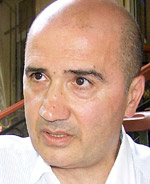Mr. Geovtchiyan is a great patriot and is dedicated to strengthening ties between Armenia and the Armenian Diaspora. He is the deputy head of the coordinating council for French-Armenian organizations. Currently, there are nearly 200 French-Armenian associations in France. All the associations have set goals to implement projects aimed towards economy, society, politics, culture and the youth. Alexi Geovtchian says that their council works with the 35 most well-known French-Armenian organizations with the purpose of centralizing and coordinating the work of independent organizations.
– The highlight of the year for the coordinating council this year is the Armenian year in France. There will be different events taking place year-round. The second issue on the agenda is validating a law to set penalties for denial of the Armenian Genocide. We hope that that law will be included in the French parliament’s agenda this November and will be adopted. Once adopted, the French Senate must approve it. The French penalty law for denial of the Armenian Genocide is going to be the first in the world.
– What should be the most severe penalty?
– If anyone in France denies the Armenian Genocide and claims that the Armenians are lying, then that person will be sentenced to six years in prison and will be fined 4.5 thousand Euro. However, the methods and money are not what’s important; the penalty must be symbolic. The important thing is that after the law is adopted, nobody can say that there was no Genocide.
– The same penalties are set for those denying the Holocaust.
- Yes, that law was passed in 1999, but that doesn’t work for the Armenian Genocide because it only includes crimes committed during WWII. The Armenian Genocide took place during the years of WWI. So, what we really need is our law. In 2001, France recognized the Armenian Genocide and now we must include the second article in that law and penalize the people who deny the genocide.
-Tell us a little about the Armenian year in France.
– We founded a French-Armenian joint committee to organize the events. It’s the council’s job to help the committee. There will be 350 events taking place in 50 French cities. The Armenian year in France has a huge political context because there are very few countries that have their “year” in France. The last countries were China and Brazil. Armenia is next. Armenia will be the last country to have an Armenian year in France. France has decided to put an end to that and other countries besides Armenia will present themselves for a shorter time-one month or seasonal. The Armenian year in France will be called “Armenia, my friend”. That title is interesting from the political perspective because it turns out that France considers Armenia as its ally. Of course, this was Charles Aznavour’s idea. Some foreign countries, especially Turkey, tried to stand in the way, but they were unsuccessful.
– It seems as though France has turned into the political battlefield for two countries-Armenia and Turkey. Each country wants to prove that it has a stronger lobbying.
- It’s our job to do the lobbying. There are nearly half a million Armenians in France and the Armenian community plays a major role. We put in a lot of effort to lobby the Armenian side when it comes to political, economic and cultural issues.
-The French government has huge problems with the Arab and black communities and it sometimes accuses them of being aggressive and contrabands. The Armenian community sets a good example of integration despite that.
– French-Armenians make a good living and live peacefully in France. I think that the most important thing is the fact that we’re Christian. That plays a major role in France. Secondly, Armenians are kind and hard-working people. If you say that you are Armenian to any French, he says, “Oh, I love Armenians”. The French won’t say the same to Arabs because they don’t have good relations with them.”
- When you tell a French person that you are Armenian, the first thing they think about is the Armenian Genocide and ask you, “Are you the people whom they massacred?” Perhaps this year’s cultural events will change the image of Armenians in France, as a happy and lively nation.
– The image of Armenians must change, but we must first solve political issues, otherwise it will be difficult to move on. The Armenian year must play a major role from this perspective and present a different Armenia to all French people. Our ideology is to present Armenian history and culture and all the events must be based on that. I think the Armenian Genocide issue shouldn’t be out in the open, not because it’s not important-it’s always in the center of attention of Armenia and the Armenian Diaspora- rather because we want to give an image of Armenia today. Today, we have a new generation and they will become the new leaders of tomorrow. From that perspective, life goes on in Armenia and Armenia is not only a historical land, but also vivid.
– Which event do you place high emphasis on?
– The most significant event will be the Luvr exhibition entitled “Saint Armenia”, which will present the treasures of Armenia created throughout three millennia. The French must understand that Armenians are an ancient people, that they didn’t perish from the face of the earth after Genocide, that they have a rich history and culture, they continue to live and create and most importantly, they are Christian. I think that this exhibition will change the view that French have about Armenians. We all need to work together and have the same ideologies. I believe that Armenia and the Armenian Diaspora have the same goals and ideas-Armenia, Genocide and Karabakh. We simply have different ways of reaching those goals. If we all work together, then there will come a day when we will be very strong as a nation.

